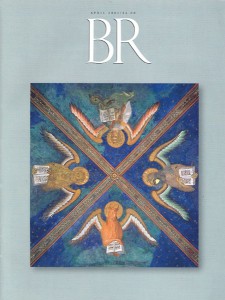The Shape of Justification
A misunderstood term has caused great confusion in understanding Paul, and it’s time to get it right.

Just before Christmas, Paul Barnett, an Australian bishop and a New Testament scholar, placed an article on his Web site entitled “Why Wright is Wrong.” (He has since toned it down to “Tom Wright and the New Perspective.”) The question at stake is: What did Paul mean by “justification”? This topic has again become a storm center, though perhaps not equally in all teacups.1
There is no space to go through Barnett’s piece and take issue with it. What I offer here, in an attempt to clarify the issues, is a brief account of how Paul’s statements on justification fit together. It is vital to separate the past, present and future tenses of justification; when we do, the real issues emerge.
1. We begin with Paul’s view of the future.
(a) The one true God will finally judge the whole world; on that day, some will be found guilty, and others will be upheld (Romans 2:1–16). God’s vindication of the latter on the last day is his act of final “justification” (Romans 2:13). The word carries overtones of a court of law.
Already a library member? Log in here.
Institution user? Log in with your IP address.

